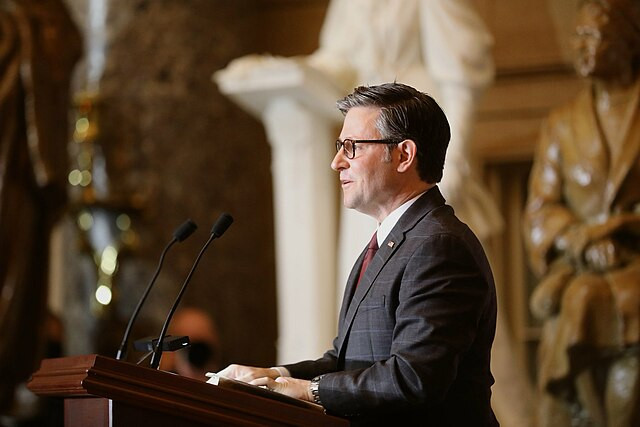House Republicans are moving forward with a spending bill aimed at keeping the federal government funded through September 30, attempting to avert a partial shutdown set to begin on Saturday. The measure, which has the backing of President Donald Trump, is expected to pass in the House this week, though it faces opposition from congressional Democrats, who argue it gives the administration too much flexibility in spending decisions.
Speaker Mike Johnson (R., La.) has scheduled a procedural vote for Monday and plans to push the bill through the House by Tuesday. "I think the CR is going to get passed. We'll see," Trump told reporters on Sunday, referring to the continuing resolution (CR) that would extend funding for federal agencies.
The proposed bill would maintain government funding at current levels while adjusting spending allocations. House Republican aides said it includes approximately $892.5 billion in defense spending, a slight increase from last year, while non-defense spending would drop by about $13 billion to $708 billion. The measure also extends a freeze on $20 billion in Internal Revenue Service funding, initially put in place under a stopgap bill in December.
The package does not include earmarks for community projects and omits funding for Social Security and Medicare, which are managed separately from the annual discretionary budget process. It does, however, provide a pay raise for junior enlisted military personnel-the largest in over four decades-as well as an additional $500 million for the Women, Infants, and Children (WIC) nutritional assistance program.
The bill's passage in the House seems likely after securing support from conservative hardliners who had previously opposed short-term spending measures. The House Freedom Caucus, which frequently disrupted government funding efforts last year, is now largely backing the bill, following a White House meeting with Trump. "I am firmly 100% in his corner," Representative Andy Harris (R., Md.), a member of the caucus, told reporters.
Representative Victoria Spartz (R., Ind.), who had previously resisted budget plans that failed to make deeper spending cuts, signaled her support as well. "I don't think we have time to do anything else. I'm being realistic," she told Reuters.
If the measure clears the House, it will head to the Senate, where Republicans hold a 53-47 majority. To pass, at least seven Democrats would need to support the bill to overcome the chamber's 60-vote filibuster threshold. While some Democrats, including Senator John Fetterman (D., Pa.), have indicated they may vote for it to avoid disruption, others remain skeptical. "Shutdowns are a bad idea. I'm not a shutdown guy," Senator Ron Wyden (D., Ore.) said.
However, moderate Democrats, including Senator Elissa Slotkin (D., Mich.), have voiced concerns about the bill's lack of oversight. "Until I see some assurances that whatever we pass next week is going to ensure that the money is spent the way Congress intends... I'm going to withhold my vote," Slotkin said on NBC's Meet the Press.
Democratic leaders in both chambers have criticized the GOP's decision to move forward without bipartisan negotiations. House Minority Leader Hakeem Jeffries (D., N.Y.) accused Republicans of trying to push through a measure that violates a previous bipartisan agreement on government spending. "If Republicans decide to take this approach, as Speaker Johnson indicated, it's his expectation that Republicans are going it alone," Jeffries said.
Senator Patty Murray (D., Wash.), chair of the Senate Appropriations Committee, expressed concerns that the bill would give Trump greater control over federal spending. This legislation would "give Donald Trump and Elon Musk more power over federal spending-and more power to pick winners and losers, which threatens families in blue and red states alike," Murray said.





